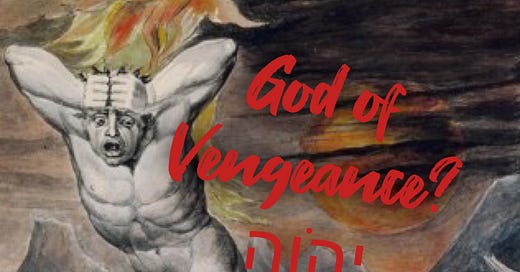“men are unable to forgive what they cannot punish and are unable to punish what turns out to be unforgivable.”
Hannah Arendt, The Human Condition
Arendt is hardly the first one to ponder the moral, ethical and political problematic of how we humans mishandle collective punishment, forgiveness, revenge and/or retribution.
The horrific reality we are now living through as the Israeli-Palestinian conflict grows worse by the day is seen through very different lenses by different people and their perspectives. Is the horror that is going on in Gaza driven by desperate defense or undisciplined revenge? Is the violence perpetrated by Hamas fueled by extremist faith and/ or the demand for justice?
We humans are capable of both of these as well as many other ways of responding to injustice.
What some consider revenge others name Restorative Justice.
And it goes on and on.
When the drive for revenge is rooted in religious terminology it gets much messier and more dangerous. Human rage in the so-called service to the sacred , even when stemming from suffering and call for justice, is the breeding ground of zealots and atrocities in the name of this or that god.
And it’s super problematic.
Today’s psalm appeals to the source of life - and vengeance. Although the choice of word to translate what’s in the original Hebrew opens up a lot of options here, some more positive than others. The ancient concept that we inherited is that of a deity motivated more by rage than by justice. Our ancestral legacy includes this primitive icon of raw retribution, glorified and valorised.
What do we do with this lethal legacy today?
Perhaps we can begin by owning up to the fact that this is in our collection of symbols and metaphors - and then work out way too challenging this dogmatic damage and channeling our natural rage in less harmful ways and more productive ways?
Start by noticing what’s on the page. The author of today’s psalm appeals to the deity from a place of suffering and pain:
אֵל־נְקָמ֥וֹת יְהֹוָ֑ה אֵ֖ל נְקָמ֣וֹת הוֹפִֽיעַ׃ הִ֭נָּשֵׂא שֹׁפֵ֣ט הָאָ֑רֶץ הָשֵׁ֥ב גְּ֝מ֗וּל עַל־גֵּאִֽים׃ עַד־מָתַ֖י רְשָׁעִ֥ים ׀ יְהֹוָ֑ה עַד־מָ֝תַ֗י רְשָׁעִ֥ים יַעֲלֹֽזוּ׃
God of retribution, ETERNAL One,
God of retribution, appear!
Rise up, judge of the earth,
give the arrogant their deserved reward!
How long shall the wicked, O ETERNAL One,
How long shall the wicked exult?
Ps. 94:1-3
“How long shall the wicked exult?” Is a tragic question that has been asked repeatedly since these words were first uttered and still echoes today. But from the rage to the desire for revenge - there is a leap that must be questioned.
Robert Alter questions it by challenging the translation of the Hebrew word ‘Nekamot’ - choosing to translate the first verse of the chapter this way:
“God of vengeance, O LORD, God of vengeance, shine forth!”
Alter comments that:
“This boldly aggressive characterization of God, ‘el neqamot, which occurs here, is fudged by the modern translations that render it in mitigating language as “God of retribution.”
As in many psalms of supplication, to which this poem is roughly allied, the speaker is filled with rage at the dominance of injustice in the world and exhorts God to manifest a spectacular appearance (“shine forth”) in order to exact grim vengeance against the perpetrators of evil.”
Is the use of ‘retribution’ easier for us to handle than ‘vengeance’? Alter was not the first to question what modern English words will represent this biblical zeal.
Biblical scholar Nahum Sarna wrote that
“Unlike “revenge,” which is essentially antisocial, “retribution” is concerned with vindication, not with vindictiveness, with upholding or restoring a just social order, not primarily with retaliation.”
Perhaps we are mincing words here and perhaps, as Arendt, Alter, Sarna and many others suggest - what words we use to describe the human urge to right wrongs does matter a great deal.
Today we are left with the heavy knowledge our ancestors, like those of many if not all people on the planet, called on their god to help them survive - sometimes at all costs. And that some of these violent and often vile notions are still with us today.
It’s on us to know where we come from, how these sentiments now displayed with such cruelty exist in our vocabulary and sacred texts, whether we like it or not.
And it is on us to not only translate these words in ways that adapt the ancient rage to honor our humanism, to prefer justice over rage - but also to do all that we can to leave these sentiments behind us, focus on means of restorative justice and let no god or human be ever again the agent of revenge.
Let’s lift up our divine images of love and justice, compassion and courage, not violent revenge and rage. Enough.
Image: William Blake, Cain Fleeing from the Wrath of God, watercolor and black ink over graphite on paper, ca. 1805–1809.
Below the Bible Belt: 929 chapters, 42 months, daily reflections.
Become a free or paid subscriber and join Rabbi Amichai’s 3+ years interactive online quest to question, queer + re-read between the lines of the entire Hebrew Bible. Enjoy daily posts, weekly videos and monthly learning sessions. 2022-2025.
Psalms #PSLAMS #Psalm94 #ספרתהילים #תהילים #BookofPsalms #כתובים #tehilim #Ketuvim #Hebrewbible #Tanach #929 #labshul #belowthebiblebelt929 #Godofvengenace #revenge #YHWH #retribution #restorativejustice #williamblake#rage #warofwrath #HannaArendt #collectivepunishment #nomorerevenge #peace #prayforpeace #nomorewar #hope #everywhere #peaceispossible



